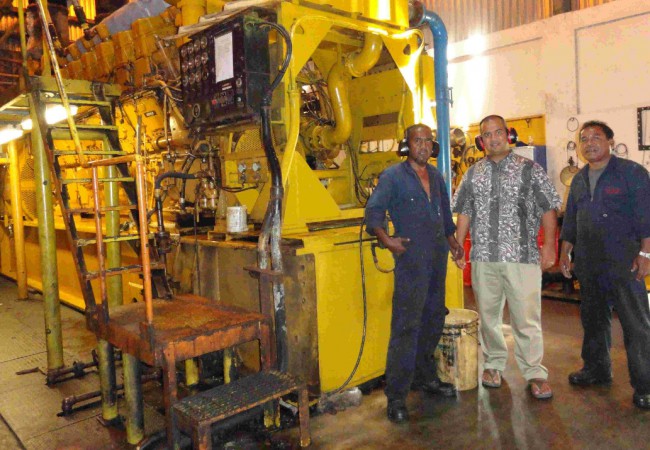
State Owned Enterprises can be reformed
With political will, good management, and the right board structure, state owned enterprises (SOEs) can function accountably and effectively. But it is not happening in many islands in the Pacific today. Yet in most parts of the region, SOEs—everything from government-run airlines to ports authorities to utility companies—exercise key functions of government. Lack of transparency and under-performance is the norm, though there are notable exceptions.
A study of SOEs by the Asian Development Bank pointed out that from FY2002-FY2010, SOEs in Fiji, Marshall Islands and Solomon Islands had a negative return on equity, while Samoa’s was barely positive at 0.3 percent. While Papua New Guinea’s rate of return on equity was 4.2 percent and Tonga’s 5.6 percent, ADB commented: ‘In each country, this rate is substantially below the profitability target set by the government and/or a commercially established risk adjusted return. In the Marshall Islands and Solomon Islands, the chronic operating losses of the SOEs require regular capital infusions from the central budget, further weakening their government’s fiscal position. In PNG as in the other countries, the poor performance of the SOEs is due to weak governance arrangements, conflicting mandates, the absence of hard budget constraints, and lack of accountability.’
Often, political leaders acknowledge the need for reform, encourage studies and preparation of reform plans, but then do not implement them. A key ingredient to success, according to a number of SOE reviews, is removing political involvement in boards and decision-making. When governments allow bad performance by SOEs, they undermine services to the public and increase costs to taxpayers.
In the Marshall Islands in FY2012, for example, all major SOEs suffered net operating losses, with total losses in the sector reaching $14.7 million—a figure over 10 percent of the national government’s budget. Air Marshall Islands is a classic example of an under-performing SOE. It has lost money continuously since it was established in 1980. There have been occasional, but usually quickly aborted attempts at reform, some in response to pressure from the private sector—which would benefit from a properly functioning domestic airline. The national government, during the terms of multiple presidents, has repeatedly injected millions of dollars to keep the national airline afloat without requiring changes in operation.
‘Public enterprises that run persistent financial losses are often bailed out or supported by national budgets or donors, and often these bail outs occur without any binding requirements for reform or restructuring,’ said a 2010 review of Marshall Islands SOEs. ‘This essentially rewards poor performance and virtually ensures that public resources will flow disproportionately to poorly performing entities.’
So how is it that in this poorly performing SOE environment, the government’s national utility company has gone from losing approximately US$20 million from FY2004-FY2012 to an operating profit of US$2.1 million in FY2013? The most important elements in the case of the Marshalls Energy Company—which oversees supply of electricity to the two urban centers and two outer atolls, Wotje and Jaluit, as well as installation of renewable energy around the country—are adherence to a recovery plan and capable management. Although there is political control of the board of directors—a Cabinet minister chairs the board and there are other government officials on the board—the Marshalls Energy Company has a heavy compliment of experienced private sector people on its board.
The company has teetered on the edge of bankruptcy since the late 2000s. It had problems with just about everything: old engines needing urgent overhauls, an estimated 25 percent electricity loss in its distribution system, large uncollectable debt, a tank farm that an IMF report in 2011 warned was so dilapidated that tanks could begin collapsing. MEC management crafted a recovery plan in 2010 and have proceeded to address each problem area in turn, getting low-interest loans to replace high-interest payments, gaining loan payment deferments to allow focus of cash in areas of need, gaining grants to fix engines, buy and install thousands of prepaid power meters, and to start work on distribution losses. Engine rehabilitation cut use of fuel in the power plant, saving hundreds of thousands of dollars each year.
In 2012, MEC had US$2.2 million in uncollectable debt. Last year, use of prepaid meters and aggressive collection turned this into a US$1.5 million positive revenue stream. Overall, by turning an operating profit and gaining millions of dollars in grants, the government utility cut its net deficiency from US$11 million to US$4 million.
The implementation of a recovery plan by the Marshalls Energy Company shows that a troubled SOE can turn itself around. But it has to have a credible plan of action and the will to implement it. The will to change directions in government or SOE operations is frequently short-lived in island governments.
The ADB’s 2012 report on SOE reform commented: ‘In Pacific island countries, political opposition to SOE reform stems from concerns about: (i) the potential loss of patronage; (ii) the loss of direct control over SOEs, which are perceived to be important policy implementation tools; and (iii) potential job losses as SOEs are restructured and made more efficient.’
It seems that unless SOEs hit bottom so there is no alternative but to reform or have exceptionally capable management—or a combination of both—there is little progress. Sadly, the Marshalls’ utility company’s turnaround is the exception, not the rule. But it does show what a state owned agency can do to improve performance, offering a roadmap for other SOEs and government policymakers.

